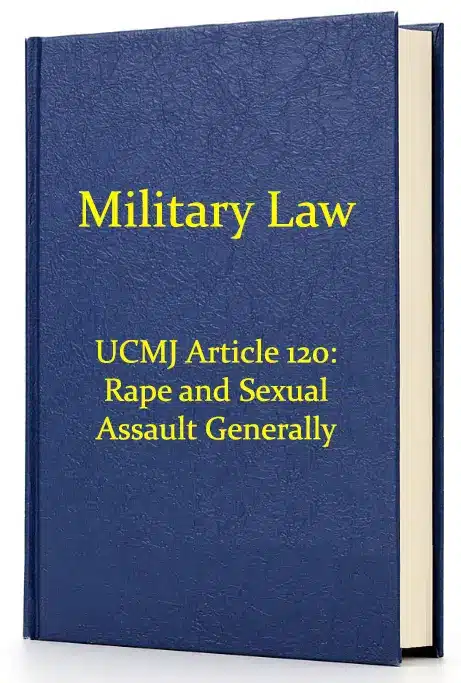A service member of the United States Armed Forces who rapes, sexually assaults, or physically abuses or threatens to abuse another person with sexual contact, groping, or unwanted sexual advances will be charged under Article 120 of the UCMJ.
Over the last 10-15 years sexual assault has been the focus of many significant changes to the Uniform Code of Military Justice, and recent events involving high-profile celebrities accused of sexual assault have again highlighted this issue. Far too often, the military approach to allegations of sexual assault is to shoot first and ask questions later. This mentality has resulted in hundreds of innocent service members finding their lives, liberty, and careers on the line. These serious charges need to be met with a severe strategic defense.
Maximum Possible Punishments for Violations of Article 120: Rape and Sexual Assault Generally
According to Article 120, the maximum punishment varies according to the alleged offense. For example:
Rape – Forfeiture of all pay and allowances and confinement for life without eligibility for parole. In addition, rape includes a mandatory minimum sentence of a dismissal or dishonorable discharge.
Sexual Assault – Forfeiture of all pay and allowances and confinement for 30 years. In addition, sexual assault includes a mandatory minimum sentence of Dismissal or dishonorable discharge.
Aggravated sexual contact -Forfeiture of all pay and allowances, confinement for 20 years, and a Dishonorable Discharge.
Abusive sexual contact – Forfeiture of all pay and allowances, confinement for seven years, and a Dishonorable Discharge.
Understanding Article 120 of the UCMJ
There are eight separate crimes outlined in Article 120. Each offense has a unique set of elements.
-
Rape involving contact between penis and vulva or anus or mouth
-
Rape involving penetration of the vulva or anus, or mouth by any part of the body or any object
-
Sexual assault involving contact between penis and vulva or anus or mouth
-
Sexual assault involving penetration of the vulva or anus or mouth by any part of the body or any object
-
Aggravated sexual contact involving the touching of the genitalia, anus, groin, breast, inner thigh, or buttocks of any person
-
Aggravated sexual contact involving the touching of any body part of any person
-
Abusive sexual contact involving the touching of the genitalia, anus, groin, breast, inner thigh, or buttocks of any person
-
Abusive sexual contact involving the touching of any body part of any person
Summary of Article 120: Article 120 offenses can be divided into categories. These include rape, sexual assault, aggravated sexual contact, and abusive sexual contact.
In the first two offenses, the law requires the government to prove penetration took place and that physical harm occurred. The material component is also present with aggravated sexual contact, although prosecutors do not have to prove penetration took place. Finally, abusive sexual contact involves other forms of sexual contact that do not meet the aggravation requirements of aggravated sexual contact.
How do you defend against Article 120 charges?
When facing the combined resources of the military and the current cultural climate, you need to be prepared to defend your career and your freedom. Crisp and Associates, LLC has a team of experienced trial attorneys who have won these cases. This team includes the firm’s founder, Jonathan Crisp, a highly respected former Army JAG with over 23 years of experience in military law and a sought-after speaker and lecturer on martial law. Donald Gordon has litigated cases before the Discharge Review Board, the Board for Correction of Military Records, and the Board for Correction of Naval Records regarding various matters and a diverse background of clients. If you know someone facing Article 120 charges, you need to speak with a Military defense attorney immediately.


